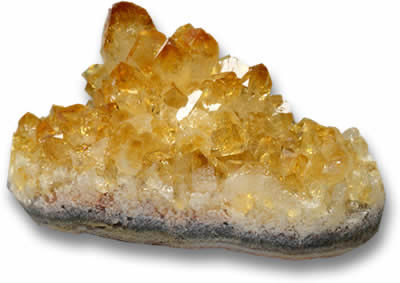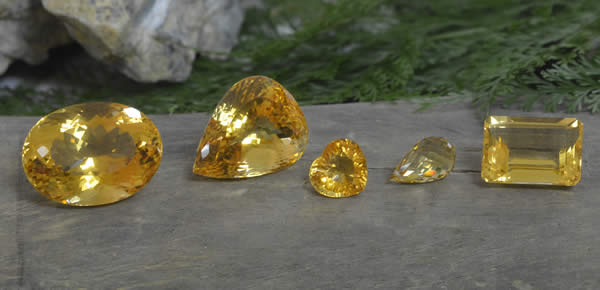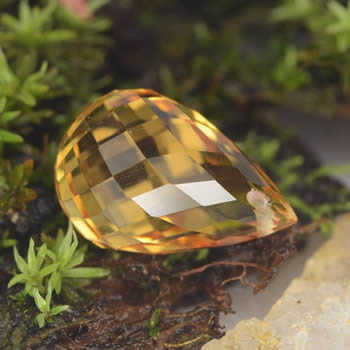Citrine Meanings and Properties
Introduction to Citrine
Citrine, known for its warm golden tones, has drawn interest for many years. This gemstone often links to ideas of wealth and prosperity, which makes its meaning quite interesting. Beyond its visual appeal, citrine offers a wealth of facts, along with beliefs about its healing aspects and various uses.
For a deeper dive, explore our comprehensive guide to citrine properties.
Sources and Production
Citrine appears in locations around the globe, with key deposits in places like the United States, Burma, Namibia, Bolivia, and Madagascar. Brazil stands out as the top producer, especially in Minas Gerais, where massive stones have turned up, such as the 20,200-carat "The Malaga." The shine, clarity, color, and toughness of citrine gems suit them well for jewelry, from basic earrings and pendants to rings and bracelets. Large citrine rings make a bold statement, appreciated for their standout look and special traits.

Symbolism and Meanings
The bright shade of citrine might explain why some think it spreads positive vibes. Often called the "success stone," it's believed to boost success, prosperity, and abundance, particularly in business ventures. Shop owners sometimes place it in cash registers, giving it the label "the merchant's stone." As one of November's birthstones - and a more affordable option compared to imperial topaz - citrine shows up in birthstone pieces and for Sagittarius zodiac folks. It also marks the 13th wedding anniversary.
Discover more on citrine's connection to prosperity and solar energy.

Metaphysical Properties
In gem lore, citrine not only sends out positive energy but also pushes away negative vibes of any sort. It doesn't pick up negativity from around it, so it never requires clearing or recharging." You can even use it to freshen up spaces with unwanted energy. It's thought to sort out family matters tied to negativity and promote stability while offering broad protection.
On the emotional level, citrine might help with feelings of depression, self-doubt, anger, and wild mood changes. This stone is said to deliver happiness and uplift to those who carry or wear it. It could curb self-harm urges, ease fears, and aid in moving past emotional pain and sorrow. Some believe it amps up sensuality too. Citrine is viewed as a spiritual cleanser and renewer, carrying traits like self-repair, motivation, and growth. It embodies solar energy and works well against depression, fears, and phobias. It's also linked to building self-worth. With citrine, one's inner light grows stronger, encouraging a forward-thinking attitude and adaptability instead of dwelling on what's behind.
Learn about citrine's role in enhancing creativity and abundance.
Gain insights into understanding citrine's chakra associations.
Healing Properties
For body-related beliefs, citrine helps with bad dreams and sleep issues. It's also thought to support the gut, stomach, thyroid, heart, kidneys, liver, muscles, hormone system, blood flow, urinary tract, and defenses. Plus, it might aid in detoxing and breaking addictions.

Disclaimer: The healing and spiritual properties discussed here draw from traditional folklore and are not proven by modern science. They're shared for interest only and shouldn't take the place of professional medical care. Please talk to a healthcare provider for any health concerns.
Production and Treatment
Since citrine quartz gains more fans than amethyst quartz, some market citrine comes from heating amethyst. This turns it yellow at about 470°C and deeper shades at 1000°C. The change lasts, and trustworthy sellers note it. Spotting heated citrine isn't easy, but most show a reddish hint.
Find out more regarding details on citrine's color variations and clarity.
Uses in Jewelry
It's no wonder citrine shines in jewelry circles; besides its deeper meanings, the golden color fits any style. Availability and reasonable prices add to its charm, making it a smart pick for gems. Various shapes and cuts allow for creative designs. Standard sizes are common, but for something different, try concave facets. Whether as a birthstone, lucky charm, or just a pretty accessory, citrine's sunny gleam can lift your spirits - and who knows, maybe usher in good fortune too.
Frequently Asked Questions
What is citrine?
Citrine is a gemstone famous for its golden yellow color, a variety of quartz often tied to prosperity and positive energy.
Where is citrine found?
Citrine occurs worldwide, with major sources in Brazil, the United States, Burma, Namibia, Bolivia, and Madagascar.
What meanings are associated with citrine?
Citrine connects to success, wealth, and abundance, earning nicknames like "success stone" and "merchant's stone."
Is citrine often treated?
Yes, much commercial citrine results from heat-treating amethyst, a stable process disclosed by reputable dealers.
What are the believed healing properties of citrine?
Traditionally, citrine is thought to aid digestion, detox, and emotional balance, but these claims lack scientific backing.
Why is citrine popular in jewelry?
Its durability, color, and affordability make it ideal for rings, pendants, and more, suiting various styles.

